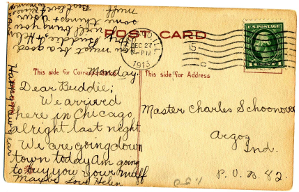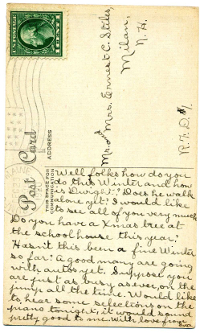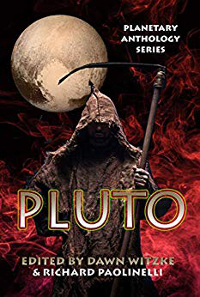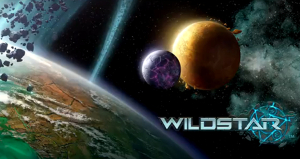Spawn of Mars
Blog of Fictioneer David Skinner
Christmas Greetings from People I Don't KnowAntique Postcards, a Century On
Saturday, November 30, 2019 5:56 pm
As I mentioned in a
post in 2017, for Christmas I decorate my mantle with antique postcards. I bought these from boxes in antique shops. Since it is now
properly after Thanksgiving, I have now placed my Christmas decorations; and for fun I present to you a couple of those postcards.
 |  |
Postmarked December 27, 1915
Master Charles Schoonover, Argosy, Ind., P.O.B. 82.
Dear Buddie; We arrived here in Chicago alright last night. We are going down town today[.] Am going to buy you your muff[.] Maybe[.] Love Helen
Happy New Year
You must be a good boy Buddie, + Helen will bring you some things + your muff. Best Love + Kisses to Mama + Papa |
 |  |
Postmarked December 23, 1920
Mr. and Mrs. Ernest C. Stiles, Milan, N.H. R.F.D. #1
Well folks how do you do this Winter and how is Dwight? Does he walk alone yet? I would like to see all of you very much[.] Do you have a Xmas tree at the school house this year? Hasn't this been a fine Winter so far? A good many are going with autos yet. Suppose you are just as busy as ever, on the jump all the time. Would like to hear some selections on the piano tonight, it would sound pretty good to me. With love from Ina |
It's amusing how Helen is focused on a muff for Buddie. A muff she may or may not purchase! Was Helen Buddie's big sister? An aunt?
Ina has more to say than Helen. I'm not sure what she means by "A good many are going with autos yet." I think I'm missing a meaning of "yet." Is she saying that a lot of people are driving cars? Or not driving, because of the winter weather? I really like the phrase "on the jump all the time." Ina's thoughts are appropriately scattered for a missive on a postcard. I'd like to hear some selections on a piano myself; and I enjoy the image of little Dwight walking alone at last.
Planetary Pluto Is OutRead My Story in It!
Friday, November 29, 2019 4:33 pm
After an unfortunate delay (which even included a change in publisher), the Pluto anthology is finally out.
Buy it on Amazon (to give me and the publisher money). Review it on Amazon (to increase its rank). Read my story
Ambit of Charon and be amazed by my geniusness.
Go, now!P.S. Sadly there's a "typesetting" problem, in that all my italics are shown as underlines. This was caught in proof but not corrected. A proper version should come out someday, but over that I have no control. For now please infer italics.
P.P.S. Update 7/24/22. The anthology is now out of print, but my story is available in my collection
Stellar Stories, Vol. 1.
Claire Randall Is a Trollop and a ShrewAnd Outlander Cheers, "You Go Girl!"
Tuesday, November 5, 2019 11:02 am
Outlander is a TV series about Claire Randall, former war nurse, who is living in Britain in 1946 when she is magically transported to the Scottish Highlands of 1743.
Outlander supposes Claire to be our heroine. But Claire is
not a heroine; and there are three things that confirm this.
Note as a preliminary that, thinking herself trapped in 1743, Claire consents to marry the sexy Scotsman Jamie, even though, back in 1946, she is already married to bookish Frank. This bigamy is not in itself the problem. There are good narrative reasons for it.
First Thing. Jamie and party are off to find a British deserter. Claire has come along because she has demonstrated (with her superior 20th-century learning) her utility as a nurse. But fearing a trap, Jamie tells Claire to hang back. He wants her safe. She promises to stay put. Once he is gone, she wanders off. She is captured by the British. Jamie and party rescue her. Once rescued, she is upbraided by Jamie for wandering off. She endangered everyone. The clan has now exposed itself to British retribution. The British commander has learned that Jamie, who is a fugitive, is hiding amongst that clan. Jamie is furious with Claire for disobeying him and breaking her promise. And what does she do? She rants about not being his property; that he can't order her around. Claire is a Strong Woman, after all. No husband, no man, can dictate to her!
Now, Claire wandered off because she sensed Craigh na Dun nearby. The standing stones of Craigh na Dun were the point of her transition to 1743 — and she wants to transit back to 1946. In other words, her reasons for disobeying Jamie were profound. Yet, instead of getting an honest character conflict (wherein Claire recognizes the enormity of her disobedience but cannot admit the time-displacement thing), we get that shrewish feminist cry "I AM NOT YOUR PROPERTY!" — as if heeding Jamie's solicitous authority and keeping her promise are equivalent to chattel enslavement. Her response is unbecoming and adolescent — as feminism be — and, what's worse, Outlander believes Claire has responded appropriately to Jamie's fury.
Second Thing. Claire has made friends with Geillis, a sassy woman who dabbles in potions and is married to a flatulent buffoon. Geillis, wanting to be with her lover, poisons her husband. Jamie tells Claire to stay away from Geillis, given the murder, the scandal, the danger from the law, and other such petty things. Again Claire promises to stay put. Then Claire gets a note from Geillis and immediately goes to see her. Does Claire ever once shrink from Geillis the murderess, the poisoner of husbands? Does she tell Geillis that maybe poisoning was a bad idea? No. Claire is only concerned for her friend. Screw the men, after all. What matters most is the happiness of Geillis, who is Claire's bestest bestie.
Outlander has no problem with Claire's myopic behavior. The sisterhood is what matters, right through the inevitable trial for witchcraft (and its attendant Christophobia).
Third Thing. Jamie, having learned that Claire is from 1946, nobly takes her to Craigh na Dun so that she might return home and reunite with Frank. At this point Jamie and Claire are in full-on monkey-sex love. As she approaches the stones it is clear that she can indeed return; the forces are calling her through. Frank, of course, is desperately unhappy in her absence; and although she can't know this, what else would he be? He's also just her husband, her proper husband, her original husband. She has some vows to uphold, I'd say. However, she stays in 1743 because, of course, it's Sexy Highlander she wants inside her.
And Outlander tells you: It's so romantic!
These three things were so off-putting that I could not accept Claire as a heroine. I kept waiting for Outlander to be honest about Claire. It never was. So never mind.
Outlander is a highbrow Harlequin Romance. It is a bodice-ripping woman's fantasy and Claire Randall is the avatar of irresponsible feminine self-centeredness.
I've got better things to watch.
A Mostly Happy YearNews of Story Submissions
Monday, September 23, 2019 12:06 pm
I submitted three stories to
Stupefying Stories. Two were accepted. Weirdly I was more affected by the third being rejected. I am not a half-full kind of guy. Still, it was surely great to have
two accepted.
So the story situation is as follows.
Ambit of Charon. This is my story in the Pluto anthology. The anthology is supposedly still happening. At this point I don't believe it will ever happen. Superversive Press seems lost. One can hope, however.
Due a Hanging. This is my second Hamlin Becker story. It will be coming out (before February) in StoryHack #6.
Banana Man and Wayward Scarecrow. These are the two accepted by Stupefying. I don't know when they will come out, but I presume it will be in the coming year.
The Fourth Gift. This is the one rejected by Stupefying. It was also rejected by Superversive (from their Luna anthology, for which it was written). Indeed, this poor story has been rejected repeatedly this year. I've been submitting it, scattershot, with little concern about whether it would "fit in" (apart from targeting SF and Fantasy mags). It's actually a great story. Really. Just this morning I threw it at another mag that is sure to reject it. But hey, you never know.
That's all. If I were trying to make a living at this writing nonsense, I would be entirely impoverished. But I'm just writing to write (and to avoid squandering what talents I have). If I get published — hooray! If not — oh well.
But in fairness to the Great Balance, I concede that the news has been enough for me to declare this year to be Mostly Happy, so far as writing goes.
P.S. I have made good if unremarkable progress on my third Hamlin Becker story. I should finish it this year, in time to submit to StoryHack.
Perfect MelancholyAn Instrumental That Shouldn't Be Lost
Saturday, September 21, 2019 11:07 pm
I was in the open beta for
WildStar, an SF MMO, back in 2014. I then subscribed for three months. The game had lots of
good in it; but it didn't hold me. Something fundamental was missing. And it was stupid hard. You really couldn't just log in and have fun. And the game's population collapsed so quickly that the open regions were always barren. I was alone in an MMO.
In any event, the music was part of its goodness. There was a piece that looped in your in-game house. It was beautiful. I made a point of returning to my house at the end of every session, in part to roleplay slightly, but mostly so that I could take my character home, tuck her into bed, and linger.
I found the piece on YouTube. It's called "Plotting Our Course." Do listen to it. It's so pretty. The melancholy is perfect. The composer made something wonderful — yet it was merely incidental music in a failed videogame. Who will remember it? Though it is not lost, it seems so precariously preserved.
And I think again of the status of art at the consummation of the world. In a post of mine from 2017, Superfluous in Heaven, I supposed that art (specifically music) might be pointless in the afterlife; and yet I hoped that it would be retained somehow. Will all mankind, newly resurrected, learn of every achievement of beauty, even the most minor? If a thing is genuinely beautiful, wouldn't God value it, too?
Will man's creations be not abandoned?
To be sure, it's hard to imagine God preserving Saw III or Big Mouth. Nothing would be in Heaven that God did not love; and God cannot love what is ugly. But what of MacBeth? Or The Big Sleep? Or Taxi Driver? Where is the line between being ugly and portraying ugliness? Do we value things that God cannot? Is our valuation so corrupted? Or does God love Breaking Bad as much as any right-thinking human?
I don't know. All I know is that WildStar contained a bit of art utterly without ugliness and I'd like that bit to endure.
In Which I Criticize the Great Stanislaw LemJust to Set the Internet Straight
Thursday, August 8, 2019 11:03 am
At least two people on the internet — let's call them Bob and Ted — have been dissuaded from reading Stanislaw Lem. That is a shame; not least because, as usually happens on the internet, they are reacting to something that isn't true.
It began with a list of the best literary SF books. Lem's Solaris is on that list, and the listmaker — let's call him Harry — said this:Lem's humans are some of the best in science fiction as well: they screw up, are late, fail to see the whole picture, act irrationally, and even the brightest of them can be swayed by vanity and pride.
To Bob, this quote is asserting that the best-written character is one who fails — indeed, that humanity itself equals failure; and who wants to read such misanthropy? To Ted, this quote is praising the irrational screw-up rather than the flawed yet ultimately competent character; and who wants to read about incompetent characters?
I'm not about to tell Bob and Ted that Lem is actually imbued with a cheerful vision or that his characters are badass heroes; because he isn't and they aren't. I suspect that Bob and Ted might dislike Lem even if they judged him by actually reading him. But it is unjust that Bob and Ted now have a distaste for Lem because of what Harry said.
You see, Harry is wrong. To say that Lem has the best humans in science fiction is to say that Frosted Flakes have the best jalapeños in breakfast cereals. There are no humans in Lem's books. There are barely any characters.
I've been reading Lem for over thirty years. I have read Solaris four or five times. I love Stanislaw Lem. But honestly, there is no denying the lack of characters in his work.
While it is true that one can point to Ijon Tichy, Pirx the Pilot, or the robots Trurl and Klapauscius, and one could say that each is distinctive, ultimately each is just a character type meant to sustain the type of story he appears in: SF comedy, SF adventure, or robot fable. Indeed, when someone like Tichy ends up in a non-comic tale, it becomes even clearer how merely flexible each character is: an appropriate Protagonist with, at most, a pinch of flavor.
This is especially true in Lem's serious novels. Not one of his characters is memorable as a person. I admit this has always disappointed me. Notably I consider Solaris so good because, rarely among his works, it utilizes actual human emotions. Another of his very best stories — The Mask, about a robot assassin who falls in love with her target — is best precisely because it engages one's sympathy (and has one of the best final sentences ever). But most of the time Lem doesn't care about people, nor emotions qua emotions. His concerns are philosophical; cosmic. His interest is in the man as an atom of mankind, not in the man as a fellow soul.
So does that make his work deficient? Dry? Dull? Not often. He writes wonderfully and sets your mind a-thinking. His robot fables are damn delightful. But, contra Harry, you will never find irrational screw-ups nor the proud and the vain in Lem's dramatis personae. Harry's statement asserts too much. What you will find in Lem is irrationality, screwing-up, pride, and vanity: that is, human weaknesses all but disembodied. A character in Lem is playing a fairy-tale role, at best demonstrating an aspect of human behavior, contributing to Lem's exposition of the cruel mysteries of the universe. Lem's characters are vessels with nametags.
You will find a Snow White in Lem, but never a Falstaff.
In the end I agree with Bob and Ted that Harry is wrong about the "best" humans. It is a pernicious lie that humans are most human when they fail. That is the self-serving excuse for sin, after all. But as I have tried to point out, Harry is wrong about Lem as well. In no sense does Lem contain the best "humans" in science fiction. So ignore Harry.
But read Lem. Yes, you may have to be selective, since at times he can get so philosophical the fiction disappears. Seek anything with Tichy, Pirx, or robots; read the novels Solaris, Eden, Fiasco, Peace on Earth, and above all His Master's Voice; and just be ready to focus on those nametags, because the characters won't really stand out otherwise.
P.S. Lem also wrote excellent reviews of, and introductions to, non-existent books and treatises; but of course these are even more removed from character-rich fiction.
Self-Publishing Is Euthanasia for StoriesThink Twice Before Consigning Your Art
Wednesday, June 19, 2019 2:59 pm
I am a caveman. I started writing in the typewriter era. Eventually PCs and word processing arose. The gatekeepers remained, however. You were published only if an editor took a fancy to you.
Vanity publishing? That was just tawdry. There was something genuinely
vain about it. It was, as well, far too much a
capital venture. You were essentially starting your own business.
Come the internet and self-publishing, though, and all those tales that had been typewritten — and turned back at every gate — could now be easily brought to the masses. Process your words, JPEG some cover, PDF the lot, and upload to some platform like Lulu or Smashwords or Amazon. Easy peasy — and barely a cent invested.
Yes, you still had to market your work. So what? That's fine. The internet lets everyone market himself. It is the era of the self! The lowliest soul can have a global presence.
In other words: You are no longer assaulting a few well-defined gates. You are instead trying to shout the loudest in the loudest cacophony ever.
Boy, you had better be able to sell yourself, and hard. Unfortunately I am a caveman. I really don't like leaving my cave. My self-published works remain unread, stored in some drawer in the cloud.
I'm not complaining about the need to self-market. Self-publishing rather reasonably entails self-marketing. My point is that, having failed to self-market (because frankly I am far too self-conscious to promote myself aggressively), my works have been published in vain — and they can never be published by anyone else.
They are dead. I have euthanized them.
No magazine takes reprints of stories — and self-publishing, it turns out, counts as printing. Hell, I've come across magazines that won't take a story you posted on your blog. Magazines are jealous beasts. The gatekeepers persist.
I naively thought that self-publishing was not final. "Hey, if this doesn't work out, I'll slink back to the slushpiles." Right? Well, maybe I can slink back, but my self-published stories are now mired in Amazon. They're done for.
Take heed, young writer. Until you have demonstrated that you can truly market a work, keep every other story in that desk of yours. Your art must be untainted by publication if you want it taken up by others.
I will never self-publish again.


 I was in the open beta for WildStar, an SF MMO, back in 2014. I then subscribed for three months. The game had lots of good in it; but it didn't hold me. Something fundamental was missing. And it was stupid hard. You really couldn't just log in and have fun. And the game's population collapsed so quickly that the open regions were always barren. I was alone in an MMO.
I was in the open beta for WildStar, an SF MMO, back in 2014. I then subscribed for three months. The game had lots of good in it; but it didn't hold me. Something fundamental was missing. And it was stupid hard. You really couldn't just log in and have fun. And the game's population collapsed so quickly that the open regions were always barren. I was alone in an MMO. 



